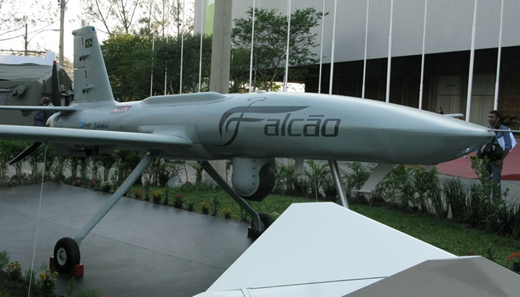 Brazilian firm Avibras is concluding final assembly of the prototype of the ‘Falcão’ [Falcon], the first domestic aircraft in the 800-kilo class, used for surveillance, reconnaissance, patrol, and sensor tasks, among other missions. The Falcão will have its inaugural flight before July.
Brazilian firm Avibras is concluding final assembly of the prototype of the ‘Falcão’ [Falcon], the first domestic aircraft in the 800-kilo class, used for surveillance, reconnaissance, patrol, and sensor tasks, among other missions. The Falcão will have its inaugural flight before July.
The Falcão’s frame is made of carbon fibre, guaranteeing a lighter vehicle and increasing the space in which it can carry fuel and sensors. With an autonomous flight capability of over 15 hours, this UAS is configured to carry a package of electro-optical equipment, a ground mobile target detection radar, and a satellite communications link. The aircraft will have an operational range of up to 1,500 kilometers.
Brazil has already invested approximately 60 million reais (31.77 million dollars) in the Falcão, which is supported by the three branches of the Armed Forces and by the Research and Projects Financing Agency (FINEP), a Brazilian government agency that promotes research and development. The electronics on board the UAS, as well as part of the navigation and control systems, the frame, and the aircraft’s mission systems integration are 100-percent domestic.
Avibras expects that the Armed Forces will define the requirements this year for the UAVs they aim to purchase, in order to begin the production phase of the project, compliance testing, and certification. The firm was also informally consulted about the vehicle’s characteristics, estimated investment, and production schedule for the first batch.
The development of these unmanned aircraft is on the list of priorities of the administration’s new national defence policy. The competition for bids to purchase the vehicles by the Armed Forces has not yet been launched, but the intention is to acquire three types of vehicles: mini-UAS weighing three to five kilos and with a range of up to five kilometers for short-range reconnaissance; 800-kilo UAS capable of 15 to 20 hours of operation for reconnaissance, surveillance, and patrols; and strategic UAS weighing over 1.5 tons for long-duration missions of over 20 hours.
The Falcão can also be integrated into the Astros II system (zone saturation rocket launchers), also manufactured by Avibras, by supplying a significant increase in situational awareness for batteries deployed on the terrain, in addition to massively increasing the system’s effectiveness in destroying the designated targets.
Photo: Tamir Eshel, Defense-Update
Source: Press Release
